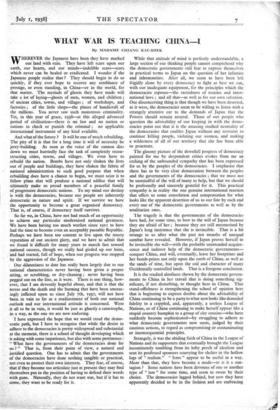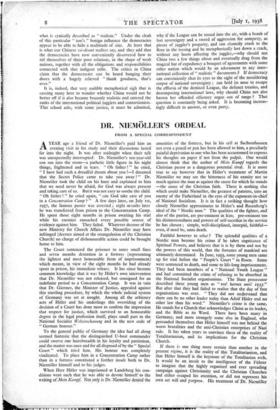WHAT WAR IS TEACHING CHINA -I
By MADAME CHIANG KAI-SHEK
WHEREVER the Japanese have been they have marked our land with ruin. They have left scars upon our earth, our hearts, and our minds—indelible scars—scars which never can be healed or eradicated. I wonder if the Japanese people realise that ? They should begin to do so quickly, if they ever hope to recover any semblance of prestige, or even standing, in China—or in the world, for that matter. The myriads of ghosts they have made will take a lot of laying—ghosts of men, women, and children; -of ancient cities, towns, and villages ; of workshops, and factories ; of the little shops—the places of handicraft of the millions. You never saw such monstrous criminality. Yet, in this year of grace, 1938—at this alleged advanced period of civilisation—there is no law and no nation or nations to check or punish the criminal ; no applicable international instrument of any kind available.
And what of the future ? It will be one of much rebuilding. The pity of it is that for a long time it will of necessity be jerry-building. As soon as the voice of the cannon dies down we must hurriedly face the task of completely recon- structing cities, towns, and villages. We even have to .rebuild the nation. Bombs have not only shaken the lives .out of people and buildings, they have shaken the fabric of _national administration to such good purpose that when .rebuilding does have a chance to begin, we must seize it to follow plans that will produce a national edifice that will .ultimately make us proud members of a peaceful family of progressive democratic nations. To my mind our destiny is with the democracies, because our people are inherently democratic in nature and spirit. If we survive we have the, opportunity to become a great organised democracy. That is, of course, if democracy itself survives.
- So far w4 in China, have not had much of an opportunity .to achieve any particular modernised national greatness. -We have been having too much warfare since 1911 to have had the time to become even an acceptably passable Republic. .Perhaps we have been too content to live upon the musty reputation of our ancient glory, and we have to admit that we found it difficult for many years to march fast toward national success, though we really had girded up our loins, and had started, full of hope, when our progress was stopped by the aggression of the Japanese.
Our dilatoriness to date has really been largely due to our 'national characteristics never having been given a proper airing, or scrubbing, or dry-cleaning ; never having been pegged out on the line, as it were. There is one thing, how- ever, that I am devoutly hopeful about, and that is that the terror and the death and the burning that have been unceas- ingly inflicted upon us since July 7th, 1937, will not have been in vain so far as a readjustment of both our national .outlook and our international attitude is, concerned. Were it all to be in vain, it would be just as ghastly a catastrophe, in a way, as the one we are now enduring.
I have expressed the hope that we would tread the demo- cratic path, but I have to recognise that while the desire to adhere to the democracies is pretty widespread and substantial at the moment, there is a school of thought developing which -is asking with some impatience, but also with some pertinence : " What have the governments of the democracies done for us ? " That is, from their point of view, a natural and justified question. One has to admit that the governments of the democracies have done nothing tangible or practical, 'not even to protect their own interests. They fear, of course, that if they become too articulate just at present they may find themselves put in the position of having to defend their words with guns.. Naturally, they do not want war, but if it has to come, they want to be ready for it.- . - - While that attitude of mind is perfectly understandable, a large section of our thinking people cannot comprehend why the democratic governments still fear to express themselves in practical terms to Japan on the question of her infamies and inhumanities. After all, we seem to have been left frigidly alone by every democracy to fight as best we can, with our inadequate equipment, for the principles which the democracies espouse—the sacredness of treaties and inter- national laws ; and all that—as well as for our own salvation. One disconcerting thing is that though we have been deserted, as it were, the democracies seem to be willing to listen with a strangely attentive ear to the demands of Japan that the Powers should remain neutral. Those of our people who question the advisability of our keeping in with the demo- cracies point out that it is the amazing studied neutrality of the democracies that enables Japan without any restraint to continue killing people, violating our women, and making a wilderness of all of our territory that she has been able to penetrate.
The gloomy picture of the downhill progress of democracy painted for me by despondent critics evokes from me an etching of the unbounded sympathy that has been expressed for us by the peoples of the democracies. I emphasise that there has to be very clear demarcation ,between the peoples and the governments of the democracies ; that we must not be unmindful of the will ofthany to help, but that we should be profoundly and sincerely grateful for it. This practical sympathy is in -reality the one genuine international reaction that offers us some consolation and compensation for what looks like the apparent desertion of us to our fate by each and every one of the democratic governments as well as by the totalitarian ones.
The tragedy is that the governments of the democracies have had, for some time, to bow to the will of Japan because they are afraid of her ; because they are still mesmerised by Japan's long insistence that she is invincible. That is a bit strange to .us after what the past ten months of unequal combat have revealed. However, if Japan proves herself to be invincible she will—with the probable unintended acquies- cence and indirect help of the democratic governments— conquer China, and will, eventually, leave her footprints and her bomb-prints not only upon the earth of China, as well as the sands of time, but upon the soil and character of many Occidentally controlled lands. That is a foregone conclusion.
It is the studied aloofness shown by the democratic govern- ments to China in her travail that is doing something sig- nificant, if not disturbing, to thought here in China. That stand-offishness is strengthening the school of opinion here that is beginning to express doubts about the advisability of China continuing to be a party to what now looks like demoded fidelity to a crippled, and, apparently, a useless League of Nations, or of China continuing to make herself appear like a stupid country bumpkin to a group of city cousins—who have suddenly become sophisticated—by struggling to adhere to what democratic governments now seem, judged by their cautious actions, to regard as compromising or contaminating or inconsequential principles.
Strangely, it was the abiding faith of China in the League of Nations and its supporters that eventually brought the League incontinently tumbling from its lofty perch of idealism and sent its professed sponsors scurrying for shelter in the hollow logs of " realism." " Isms " appear to be useful in a way. More than that, they have become a mode—or is it a con- tagion ? Some nations have been devotees of one or another type of " ism " for some time, and seem to swear by their choice. The democracies lagged behind, but now they have apparently- decided to be in the fashion and are embracing what is cynically described as " realism." Under the cloak of this particular " ism's " benign influence the democracies appear to be able to hide a multitude of sins. At least that is what our Chinese soi-disant realists say, and they add that the democracies have now conveniently discovered how to rid themselves of their poor relations, in the shape of weak nations, together with all the obligations and responsibilities connected with that indigent tribe. The critics in China claim that the democracies can be heard banging their doors with a hugely relieved " thank goodness, that's over."
It is, indeed, that very audible metaphorical sigh that is causing many here to wonder whether China would not be better off if it also became brazenly realistic and entered the ranks of the international political jugglers and contortionists. This school asks, with some justice, it must be admitted, why if the League can be tossed into the air, with a bomb of lost sovereignty and a sword, of aggression for company, as pieces of juggler's property, and can clumsily crash to the floor in the tossing and be metaphorically lost down a crack, without any hoots affecting the juggler,—why should not China toss a few things about and eventually drag from the magical bat of expediency a bouquet of agreements with some other nation which would be an adornment to any inter- national collection of " realistic " documents ? If democracy can conveniently shut its eyes to the sight of the mouldering corpse of national sovereignty ; can hold its nose to escape the effluvia of the demised League, the defunct treaties, and decomposing international laws, why should China not also hasten her offended olfactory organ out of range ? That question is constantly being asked. It is becoming increas- ingly difficult to answer, or even parry.



















































 Previous page
Previous page